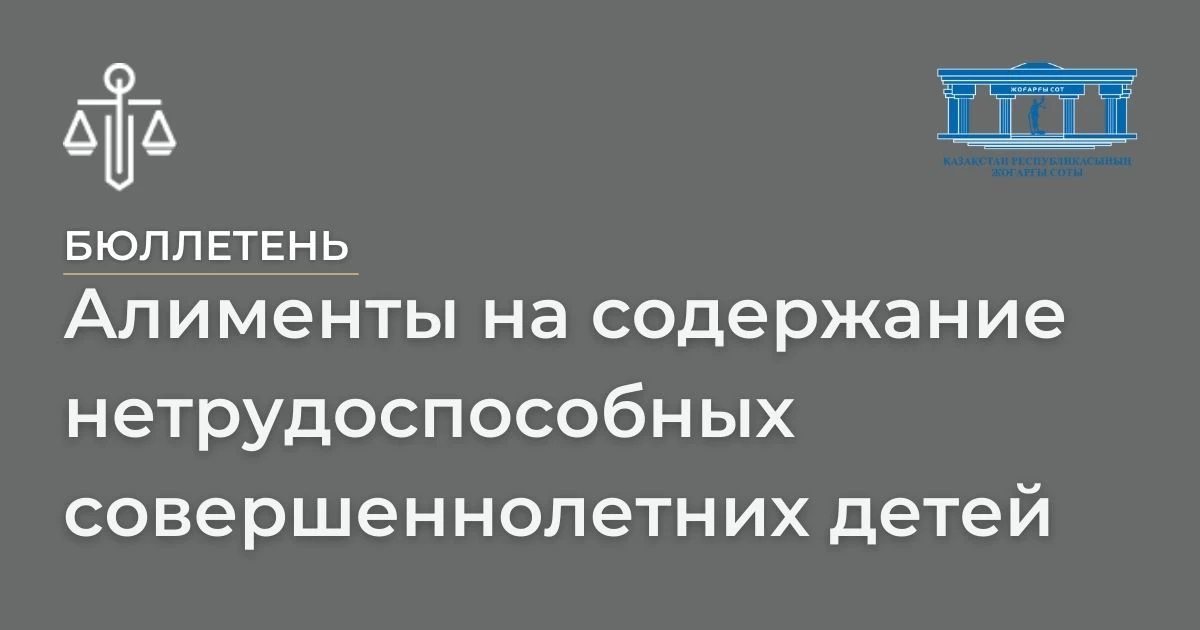Alimony for disabled adult children
Unlike cases on the recovery of alimony for minor children, judicial practice in resolving disputes related to the recovery of alimony for adult disabled children is insignificant. By virtue of article 143 of the Code, able-bodied parents are required to support their disabled adult children in need of assistance. In the absence of an agreement on the payment of alimony, the amount of alimony for disabled adult children is determined by the court as a multiple of the monthly calculation index (hereinafter referred to as the MCI) in effect at the time of payment of alimony, based on the financial and marital status and other interests of the parties that deserve attention. Courts classify adult children who are recognized as disabled in accordance with the established procedure as disabled persons. By virtue of subparagraph 1) of paragraph 2 of Article 13 of the Law of the Republic of Kazakhstan "On State Social Benefits for Disability and Survivor's Loss in the Republic of Kazakhstan" dated June 16, 1997 No. 126 (hereinafter referred to as the Law on State Social Benefits), children (including adopted children, stepsons and stepdaughters) are considered to be disabled family members, under the age of eighteen and over, if they became disabled before the age of eighteen. The generalization showed that when determining the need for alimony for an adult disabled child, the courts proceeded from the fact that receiving a pension, scholarship or allowance for such a child, or having one or another property does not deprive him of the right to receive maintenance from his parents if the available funds are insufficient to meet the necessary needs.
The fact that a disabled adult child was in need was determined by the court in each specific case, taking into account the circumstances of the case. In this regard, the courts checked whether the financial situation of an adult disabled child was sufficient to meet his life needs, taking into account his age, health status and other circumstances (expenses for the purchase of necessary food, clothing, medicines, payment for housing and utilities, etc.), and found out whether pensions and other social benefits were sufficient. assistance received at the expense of the state to meet these needs, what other income the plaintiff has, and also found out the financial and marital status of the parents. The courts considered such circumstances as the defendant's disability (the parent of an adult disabled child), the adult disabled child's need for additional treatment, nutrition, care, and other circumstances to be noteworthy for the interests of the parties.
Example: Court No. 2 of the city of Uralsk in a case related to A.'s claim to his father D. for the recovery of alimony in a fixed amount of money, decided to recover alimony from the defendant in favor of the plaintiff monthly in a fixed amount of money in the amount of 4 times the MCI effective at the time of payment of alimony. During the trial, it was established that the plaintiff is a group II disabled person and suffers from a serious illness requiring systematic examination and treatment. The plaintiff's income consists of the state social disability allowance for group 2 since childhood in the amount of 38,000 tenge, a monthly college scholarship in the amount of 38,000 tenge. The defendant's monthly income is 43,000 tenge. The plaintiff needs financial assistance due to the fact that after eye surgery, he was recommended medications with a total cost of 34,000 tenge, which must be taken monthly. The court, proceeding from the principle of reasonableness and fairness, taking into account the difference between the plaintiff's income and medical expenses, the financial and marital status of the defendant, partially satisfied the claim. The plaintiff, referring to the defendant's concealment of his income and the insufficiency of the collected amount for treatment, appealed the decision, which was left unchanged. The generalization also revealed that the courts, when considering cases of adult children against one of the parents, do not always involve the other parent in the case as a third party, do not clarify his financial and marital status. Whereas the other parent is also required to participate in the maintenance of an adult child who is unable to work.
Attention!
Law and Law Law Law draws your attention to the fact that this document is basic and does not always meet the requirements of a particular situation. Our lawyers are ready to assist you in legal advice, drawing up any legal document suitable for your situation.
For more information, please contact a Lawyer / Attorney by phone: +7 (708) 971-78-58; +7 (700) 978 5755, +7 (700) 978 5085.
Attorney at Law Almaty Lawyer Legal Services Legal Advice Civil Criminal Administrative Cases Disputes Protection Arbitration Law Firm Kazakhstan Law Office Court Cases


